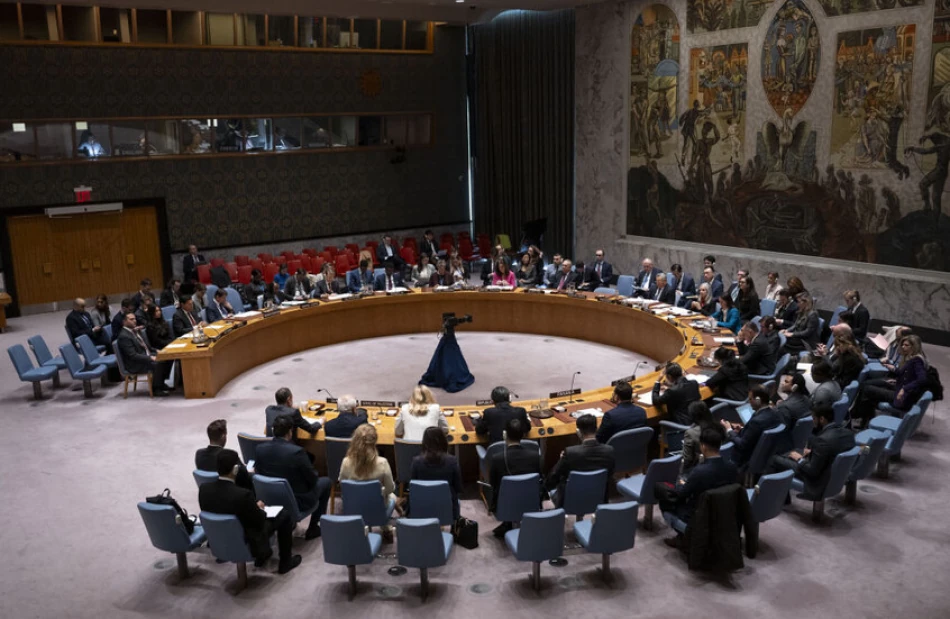
U.S. Veto Halts Gaza Ceasefire Resolution Amid Escalating Conflict
US Blocks Sixth UN Gaza Ceasefire Resolution, Highlighting Deep International Divisions
The United States wielded its veto power for the sixth time since the Gaza conflict began nearly two years ago, blocking a UN Security Council resolution that would have demanded an immediate, unconditional, and permanent ceasefire in Gaza. The move underscores America's unwavering diplomatic support for Israel while exposing the growing isolation of Washington's position on the international stage.
Overwhelming Support Meets Familiar Opposition
The resolution, crafted by the ten elected members of the 15-member Security Council, garnered support from 14 countries—a near-unanimous backing that highlights the global consensus for ending the prolonged conflict. Only the US stood in opposition, using its permanent member veto power to prevent the measure from passing.
The proposed resolution went beyond calling for a ceasefire, demanding that Israel lift all restrictions on humanitarian aid delivery to the Palestinian territory and calling for the immediate and unconditional release of all hostages held by Hamas and other factions.
A Pattern of Diplomatic Isolation
Strategic Calculations Behind the Veto
This sixth US veto reflects Washington's consistent strategy of shielding Israel from international pressure while the conflict continues. The Biden administration has repeatedly argued that premature ceasefire resolutions could undermine ongoing diplomatic efforts and fail to address Israel's security concerns regarding Hamas's military capabilities.
However, the overwhelming support for the resolution—14 out of 15 members—demonstrates how isolated the American position has become. This level of international consensus is rare in Security Council votes, particularly on Middle Eastern issues that typically divide major powers.
Comparing International Responses
The US approach contrasts sharply with positions taken by traditional allies. European nations, including France and the UK, have increasingly supported ceasefire measures, while emerging powers like Brazil and South Africa have been vocal advocates for immediate cessation of hostilities. Even countries with historically strong ties to Israel have shown growing impatience with the conflict's duration and humanitarian toll.
Implications for US Foreign Policy
Diplomatic Costs and Strategic Risks
Each successive veto carries mounting diplomatic costs for the United States. The repeated blocking of ceasefire resolutions undermines America's ability to position itself as a neutral mediator and damages its credibility on human rights issues globally. This could have long-term implications for US influence in international institutions and its relationships with key allies.
The pattern also provides ammunition to rivals like China and Russia, who can point to American vetoes as evidence of Western hypocrisy on international law and humanitarian concerns. This narrative resonates particularly strongly in the Global South, where support for Palestinian rights remains high.
What This Means Moving Forward
The sixth veto suggests that the US remains committed to allowing Israel maximum flexibility in its military operations, despite growing international pressure and mounting civilian casualties. This approach reflects deep strategic calculations about regional stability, the US-Israel relationship, and domestic American political considerations.
For international observers, the vote reinforces perceptions that the UN Security Council's veto system allows single permanent members to block global consensus on critical humanitarian issues. This dynamic continues to fuel debates about UN reform and the need for alternative international mechanisms to address prolonged conflicts when the Security Council remains paralyzed.
The resolution's failure also means that diplomatic pressure for a ceasefire will likely shift to other forums, including the UN General Assembly, regional organizations, and bilateral diplomatic channels, where the US veto power cannot prevent international condemnation or calls for action.
Most Viewed News

 Sara Khaled
Sara Khaled






